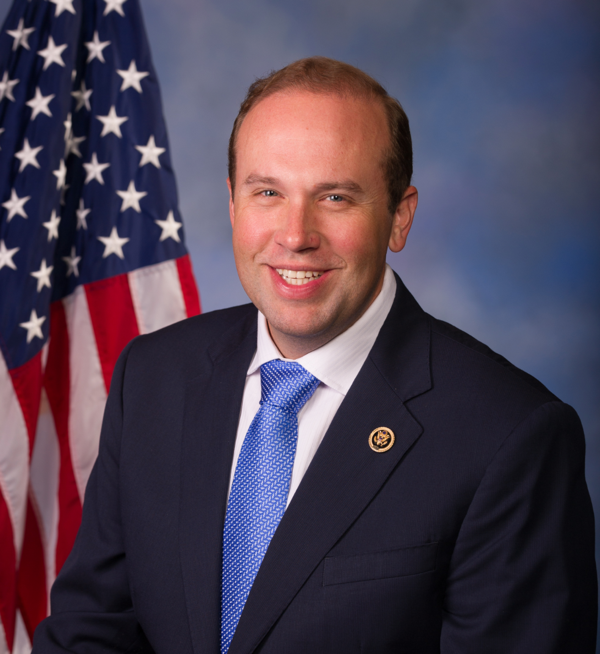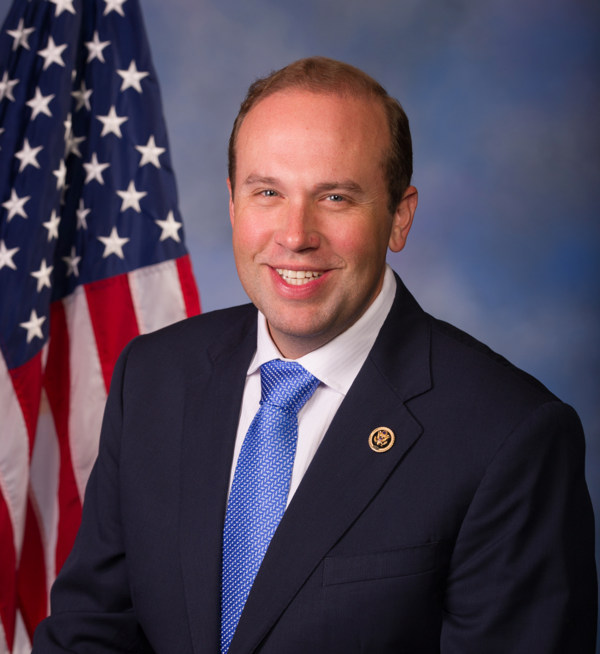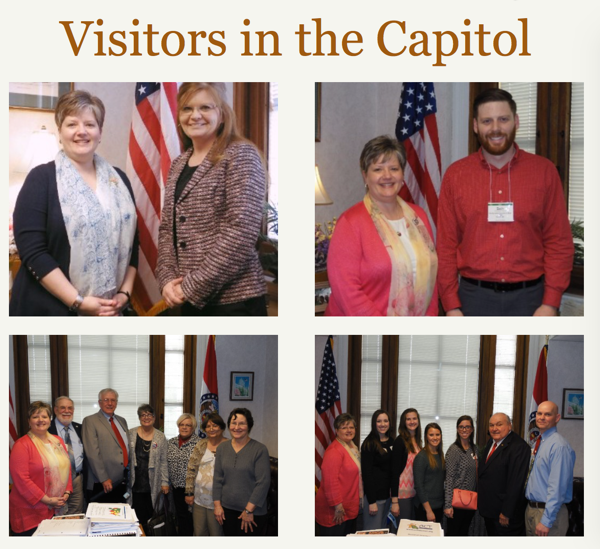
Missouri’s public schools would be fully funded for the first time under the budget proposal unveiled by the House Budget Committee Chairman this week. The proposed spending plan would also restore a proposed cut to in-home care and nursing home services for senior and disabled Missourians.
The Budget Chairman said the 13 appropriations bills that will make up the Fiscal Year 2018 state operating budget represent the legislature’s commitment to its young people, as well as to its most vulnerable citizens.
In addition to the additional $48 million that will fully fund the School Foundation Formula, the House budget proposal restores proposed cuts to K-12 transportation funding. The plan also secures $6 million in funding to increase broadband internet access for Missouri schools. Additionally, the House budget plan restores $21.75 million in proposed cuts for the state’s institutions of higher learning.
The FY 2018 spending plan proposed by the House Budget Committee also restores approximately $52 million in proposed cuts that would have impacted 20,000 seniors and disabled Missourians who currently qualify for state-funded in-home care and nursing home services.
Other notable funding decisions in the House plan include $3.5 million to fulfill the state’s commitment to the Biodiesel Producer Incentive Fund, record levels of funding for the state employee pension plan, and $1.4 million to fund a system of voter identification in Missouri.
The House Budget Committee will work to finalize the budget bills and send them to the floor when the House returns from Spring Break. House Leaders plan discuss the bills on the House floor and have them out of the House by April 6. The Senate and House will then have until May 5 to agree to a spending plan and send it to the governor.
House Approves Legislation to Create Senior Service Protection Fund (HCB 3)
The members of the Missouri House have approved a change to the state’s circuit breaker tax credit that will free up funds for vital in-home care and nursing home services for Missouri’s most vulnerable citizens.
It was in early February that Governor Greitens unveiled a budget plan that proposed saving $52 million by changing the eligibility standards for home and community-based services. As a result, approximately 20,000 seniors and disabled Missourians would no longer qualify for the state-funded care. House leaders responded by working toward a solution that would provide funding for the programs during a difficult budget year.
The legislation approved this week would create the Missouri Senior Services Protection Fund to provide funding for services for low-income seniors and disable persons. To provide the funding, the legislation ends the renter’s portion of the senior citizens property tax credit. The change would generate up to $56 million in funds that would be used to help provide health care services to Missouri’s most vulnerable citizens.
Proponents of the change say it returns the credit to its intended purpose of providing property tax relief for seniors so they can afford to stay in their homes. They say the Senior Services Protection Fund will allow the state to reinvest money to more effectively serve low-income seniors and disabled Missourians. Supporters also say the change will not diminish Missouri’s commitment to its most vulnerable citizens, and will instead ensure those who need care the most will receive it.
Those who oppose the bill say that eliminating the tax credit would impact many disabled and senior citizens greatly by removing funds they use to purchase goods and services not covered by Medicaid. They say there are other options the legislature could explore to secure funding for in-home care and nursing home services. They say it does not benefit seniors to swap one necessary program for another.
Legislation to Stop Illegal Use of Herbicides Receives Final Legislative Approval (HB 662)
The House and Senate have agreed to legislation that is meant to stop the illegal use of herbicides that have caused widespread damage to crops in Southeast Missouri.
According to experts from the University of Missouri, many farmers in that region lost an average of 35 percent of their crops when neighboring farmers used an outdated Dicamba product. Wind and temperature changes caused that product to spread onto nearby fields. Because the product was drifting onto fields not planted with seeds resistant to it, those crops were damaged. At least 150 farmers were impacted by the illegal use of the product.
The legislation approved by the House would allow the Department of Agriculture to issue a fine to any individual who knowingly applies a herbicide to a crop for which the herbicide is not labeled for use. Under current law, the fine is a flat $1,000, which the sponsor of the bill said is not a strong enough deterrent. Under the bill, the department could issue a fine of up to $10,000 per violation when a product is spread illegally. The fine would escalate to up to $25,000 per violation for those who repeatedly break the new law. The money collected from any fines would go to the local school district in which the violation occurred.
The bill would also give the Department of Agriculture additional powers to investigate claims of illegal herbicide use. The department would be able to subpoena witnesses and compel the production of certain records related to the misuse of herbicides. Farmers penalized for illegal use would be liable to the department for its expenses and for personal property affected.
The bill includes an emergency clause, which would make it effective immediately upon being signed by the governor.
Expert Witness Legislation Headed to the Governor’s Desk (HB 153)
This week the Senate took up and passed House legislation meant to improve the reliability of expert evidence that is presented to juries in Missouri state courts. The bill, which is now on its way to the governor, would implement an established standard for determining when expert-witness testimony is admissible as evidence at trial. The proposed standard, which is commonly referred to as the Daubert standard after a 1993 U.S. Supreme Court case, is used in federal courts and in more than two-thirds of the states.
The bill is an important component of the legislature’s tort reform efforts this year. Supporters of the change say the bill will ensure that testimony from someone designated by lawyers as an ‘expert’ can be relied upon by citizen jurors.
Supporting Missouri’s Sheltered Workshops (HCR 28)
This week, House members showed their support for the thousands of Missourians with developmental disabilities who develop professional skills in the state’s sheltered workshops.
Sheltered Workshops provide a controlled work environment and a program designed toward enabling individuals with disabilities to progress toward normal living. Currently, more than 6,300 Missourians with developmental disabilities are employed by Missouri’s 92 sheltered workshops, with another 1,100 waiting to work.
Unlike many states, Missouri does not use federal dollars to fund the workshops. Instead, the workshops generate as much as 70 to 80 percent of their funding from contract services, and then receive additional funds from their county and the state.
Despite this, the federal government has impacted the way workshops operate in Missouri. Supporters of workshops say the Workforce Innovation and Opportunity Act, which went into effect in 2016, is adding bureaucratic layering that slows the process of finding work for those who have disabilities. They refer to it as an unfunded mandate that is placing an undue burden on the workshops.
The House approved a resolution to reaffirm Missouri’s support of the sheltered workshops in the state. The sponsor hopes it will help send a message to federal legislators that will cause them to take a second look at the unintended consequences of the Workforce Innovation and Opportunity Act.
Raising the Marriage Age to Protect Young People (HB 270)
The legislature continued its fight against human trafficking this week as the House approved legislation to raise the minimum age for marriage from 15 to 17 years old.
Missouri currently has a minimum age of 18 to obtain a marriage license without parental consent. Young people age 15 to 17 can receive a license with parental consent. Individuals of any age also have the option to get married without consent if they successfully petition the court to obtain a license.
The legislation approved by the House would raise the age requirement to 17. An earlier version of the bill had raised concerns that Missouri law would block a marriage and interfere in the decision of a family in situations in which no coercion or wrongdoing is present. The bill’s language was changed to require a hearing before a judge, so that parties can present evidence that the marriage is advisable. The bill also includes a provision to ensure no marriage license is issued to any person 21years of age or older if the other party to the marriage is less than 17 years of age.
Supporters say the goal of the bill is to prevent child marriages that are used to disguise abusive situations and human trafficking. They note that Virginia recently raised its minimum age requirement after seeing a large number of underage girls marry men who were far older. According to one study, more than 7,300 teens under the age of 18 were married in Missouri from 2000 to 2014.
House Approves Cronkite New Voices Act to Ensure the Free Speech Rights of Student Journalists (HB 441)
The members of the Missouri House gave approval this week to legislation designed to better protect the free speech rights of student journalists. The Cronkite New Voices Act is meant to ensure high school and college student reporters will be able to do their jobs without fear of censorship from administrators or teachers.
The bill is modeled after legislation approved in Kansas, Illinois, and North Dakota. If approved in Missouri, it would prevent school authorities from exercising prior restraints over student media except when they are about to publish libelous or slanderous material, invade privacy, violate state or federal law or incite students to create a clear and present danger to the institution. It also would restrict authorities from disciplining student journalists or controlling their activities outside of school. Additionally, the bill would require each school district to adopt a written student freedom of expression policy.
Supporters note that student journalists often work on controversial topics and that schools sometimes do not allow the stories to come to light. They note that the 1988 Supreme Court case, Hazelwood School District v. Kuhlmeier, decided that a high school-sponsored newspaper produced as part of a class without a clear policy establishing it as a public forum for student expression could be censored. Supporters say it’s important to protect the first amendment rights of student journalists

Check Your Tackle Box & Keep an Eye on Your Gun Case
March 17, 2017
Did you know that on his way out of office, President Obama tried to regulate the ammo in your gun and the fishing sinkers in your tackle box?
Before he jetted off to the Caribbean, President Obama managed to take a final swipe at Missourians’ way of life with “Director’s Order No. 219,” a last-minute regulation that banned lead ammunition and fishing tackle on federal lands. In other words, President Obama’s rule would not have allowed you to take shotgun shells or fishing sinkers with you to hunt in Mark Twain National Forest or fish at Clearwater Lake.
Printed out, the current Code of Federal Regulations would physically cover more than 2.5 acres of land. That is 175,268 pages of burdens weighing down Missourians. Fortunately, I was able to stop them from adding another page to that stack and defend our right to decide what we do with our weekends.
After hearing the concerns of hunters and fishermen in southern Missouri, I led the effort to have 60 Members of Congress send a letter to President Trump asking him to overturn the ban. You see, in Missouri, we know how to be good stewards of the land God has given us, and we do not need the federal government monitoring our movements while we enjoy creation. At the beginning of this month, my letter to President Trump resulted in the Obama-era lead ban being overturned by my friend and former colleague Ryan Zinke in one of his first acts as U.S. Department of Interior Secretary.
This rule had no basis in science and was written without any input from those most affected by its enactment. Sportsmen and fishermen are some of our country’s greatest conservationists. Obama’s order only served to hinder them from participating in the recreational use of federal lands they’ve enjoyed for decades. The regulatory red tape thrown up by unelected bureaucrats over the last eight years is exactly what the American people soundly rejected when they elected Donald Trump in November.
It was a complete overreach by the Obama administration to decide what type of ammunition or fishing tackle you carry while exploring the great outdoors of Missouri. In typical Washington, D.C. fashion, President Obama wanted to show Missourians that he knew what was best for us. Fortunately, we have a new president who understands and trusts us to tell him what we need, not the other way around.
We have all seen President Trump’s work thus far, undoing the damage of President Obama’s executive actions and appointing the right people like Secretary Zinke to do the same thing. After eight years of Obama’s overreach, whether it is something as big as Obamacare or as small as the fishing tackle you pack on a weekend trip with your family, I am committed to defending southern Missouri’s way of life.

Courtesy Resolutions
Courtesy resolutions can be requested for many reasons including, but not limited to, an Anniversary, Birth, Eagle Scout Award, Marriage, Birthday, Business Opening, Special Award, Retirement, or Sports. Please do not hesitate to contact my office should you like to request a Courtesy Resolution. If you would like to have me personally present the Courtesy Resolution, please call my office and my assistant will be happy to work with you to schedule for this. My office number is 573/751-1494.
Scheduling a Visit with Me Back in the District
I always enjoy visiting with my constituents in the 151st District. Some of my favorite groups are school aged children but I also enjoy meeting with every age group! If you would like to schedule a visit with me, please call my office at 573/751-1494, my assistant will be happy to work with you to arrange a time for us to visit. Visits can include reading and talking with school children, visiting retirement centers, visiting non-profit groups, businesses, coffee talks, and more.
Visiting the Jefferson City and the Capitol
Even though we are out of session from June to December, any time of the year is a great time to visit the Capitol. The building is a beautiful place to visit and my assistant will be happy to arrange a tour for you while you are in Jefferson City. There are many interesting places to visit during your visit to our state Capitol. A great way to get to Jefferson City is via Amtrak if driving is not possible or challenging. Visitors can tour the Missouri Supreme Court, Old Missouri State Penitentiary, the Missouri Military History Museum, the Missouri State Highway Patrol Museum, and more.
Missouri and United States Flags
If you know of a school, retirement center, non-profit group, or someone else that is in need of a flag, please contact my office at 573/751-1494 and we will arrange to have a new flag sent or delivered to them.
Scheduling Class or Large Group Visits at the Capitol
If your school is planning on traveling to the Capitol between January and May, contact my Capitol office as soon as you know a date to set up the tour, things become busy very quickly during the session. Tours of the Governor's Mansion and Capitol fill up rapidly with schools from all over Missouri, so, the sooner, the better. It is best to set up your school visits or large group visits at least 6 months out if possible. If this is not possible, contact my office and we will try very hard to see what we can arrange for you, rest assured, not all will be lost though, there are plenty of self-guided tours and other sites to visit. If you are planning a visit during the Interim Period, June through December, please call my office, if I am in Jefferson City during your visit, I would enjoy scheduling a visit with you and showing you the Capitol!
Service Member and Veterans Services
Enough cannot be said of the sacrifices our brave men and women of the Armed Forces make for our freedoms every day, both at home and abroad. The Missouri Veterans Commission has put together a guide for Missouri resources for military service members and their families with contacts for local VA Hospitals and Centers, the American Legion, the VFW, the other resources for our veterans. To request one, please contact my office at 573/751-1494 and we will be more than happy to provide you with a copy of this helpful guide.

March 3, 2017
My grandmother once told me, “God gave you two ears and one mouth so that you would listen more than you speak”. On Tuesday night I listened and followed along as President Trump delivered the most important speech of his new Presidency. What I heard was a message of strength, of unity, and of determination from a President committed to using his time in office to put the needs of the American worker, family, and farmer first above all else.
Laid out were plans to rebuild our military, invest in our nation’s infrastructure, and to take care of our veterans. I heard about investment in students, in those underemployed and unemployed as well as a plan to make life easier for working parents. Our President talked about his desire to work with Republicans and Democrats alike to remove the government intrusion between you and the doctor of your choice and to lower the costs of sky rocketing healthcare premiums for millions of Americans. He talked about reducing the regulatory and taxation burden which is suffocating so many middle class families, farmers, and small businesses. He laid out a vision for securing our border, properly vetting those trying to enter our country, and enhancing the safety and security of American families.
Maybe what struck me the most was the stark contrast of this speech compared to the empty rhetoric of the last eight years. Instead of a glorified vision of what ‘change’ may one day come, I heard a man determined to actually take the steps now to improve the lives of American’s tomorrow. Just this week the President finally put an end to the dreaded “Waters of the United States” Rule which would have allowed the EPA to regulate every lake, pond, stream or flow of water on a farmer’s land. This is something I have authored language to defund and that over my last two annual farm tours I have heard consistent concerns, complaints and criticisms about – Washington regulators who have never step foot inside Missouri writing rules and orders impacting the very families and farmers back home who are charged with feeding the world.
The President was spot on, “In 2016, the earth shifted beneath our feet...the chorus became an earthquake.” He was speaking to you, to me, and to all of us who have had enough of the government knows best mentality. To us who want to shrink the size of a bloated federal government, who believe in personal liberties and freedoms and who believe our founders knew what they were doing when they wrote the United States Constitution.
For me, one of the most memorable moments occurred when the President was speaking about his role as Commander in Chief and a return of the United States to its rightful place as a world leader who stands with its allies and deters its enemies. The President recognized Carryn Owens, the widow of Senior Chief William “Ryan” Owens of the U.S. Navy. Ryan died giving his life to secure America’s place in the world. He went to those countries few will ever visit - those areas where coward terrorist networks live, plan, and hide. Ryan’s job was to gather intelligence on and help root out these hate filled individuals in order to keep American families safe thousands of miles away. Ryan gave his life so that your family, my family and our friends and families around Missouri are secure each and every day.
When I think about people like Ryan, it is easy for me to answer back – “Yes, Mr. President, we are ready to lead again”.

Helping Missouri Small Businesses Grow
The Missouri House recently approved legislation that would provide a boost to the state’s small businesses, including many in rural areas. House members voted in favor of a bill that would expand the Missouri Works program so that more of the state’s small businesses would be eligible for workforce training benefits.
The sponsor of the bill noted that in many areas of the state there are small businesses that do not qualify to obtain the benefits provided through Missouri Works. These businesses fall short of the program’s qualification criteria such as number of workers employed, or health insurance benefits provided. The bill approved this week would allow these businesses to pool together with businesses that do meet all of the program’s criteria in order to receive benefits. Specifically, the bill would allow a group of businesses to qualify as long as the majority of them meet the program’s criteria.
The Missouri Works program, which was created by the legislature in 2013, is the state’s number one incentive tool for expansion and retention. The program helps businesses access capital through withholdings or tax credits to embark on facility expansions and create jobs. It works to assist companies with the training of employees in new jobs and the retraining or upgrading of the skills of full-time employees in retained jobs.
Supporters of HB 93 say the bill will help more small businesses take advantage of the Missouri Works program. The change will give the department more flexibility to distribute the program’s benefits throughout the state.
Preparing Students for the Workforce
The members of the Missouri House approved legislation this week to give students a more direct path to the workforce. The bill approved by the House would provide students with the option to obtain ACT National Career Readiness Certification. The certification is meant to demonstrate the individual has essential, verifiable workplace skills.
As the sponsor of the bill told her colleagues on the House floor, many students take the traditional ACT test and then end up not going to college. By making the National Career Readiness Certification an option, legislators hope to give Missourians the ability to document their essential job skills, while also giving employers a helping hand in identifying capable workers.
Right now Missouri has 84 counties that participate in the Certified Work Ready Communities program that is designed to attract, retain, and develop a workforce with the education and fundamental skills to succeed in the 21st century. More than 3,300 businesses across the state participate in the program and are ready to hire employees with National Career Readiness Certification.
House Approves Bill to Continue Support for Pregnancy Resource Centers
The Missouri House took action this week to continue a tax credit program that helps secure funding for pregnancy resource centers and maternity homes in the state. Supporters say the tax credits encourage investment in programs that benefit many of Missouri’s most vulnerable citizens.
Under current law, the tax credit for donations to maternity homes is set to expire June 30, 2020. The tax credit for donations to pregnancy resource centers expires December 31, 2019. The legislation approved by the House would extend the sunset for both credits to 2023. There are $2.5 million in credits available each year for pregnancy resource centers. Each credit requires a minimum contribution of $100, of which 50 percent is tax-credit-eligible. Donors can claim up to a $50,000 credit per tax year. The maternity home tax credit works in similar fashion.
There are currently 69 pregnancy resource centers in Missouri that benefit from the tax credits. The centers provide assistance to women with crisis pregnancies or unplanned pregnancies by offering pregnancy testing, counseling, emotional and material support, and other similar services to encourage and assist such women in carrying their pregnancies to term. The state currently has 17 qualified maternity homes, which are residential facilities established for the purpose of providing housing and assistance to pregnant women who are carrying their pregnancies to term.
House Members Urge the United States Senate to Confirm Judge Neil Gorsuch as United States Supreme Court Justice
Members of the Missouri House took action this week to urge the United States Senate to confirm Judge Neil M. Gorsuch as a United States Supreme Court Justice. The House approved a resolution supporting Gorsuch, who was nominated by President Trump and currently serves as a judge on the United States Court of Appeals for the Tenth Circuit.
The resolution notes that Gorsuch is an outstanding jurist with a commitment to upholding the United States Constitution and the rule of law. It also points out that he respects the role state government has and he consistently defends the constitutional rights to freedom of speech and religion and the right to bear arms. In passing the resolution, House members also praised Gorsuch for being a constitutional scholar, who will ensure the three branches of government act within the roles assigned to them by the United States Constitution.
Gorsuch’s confirmation hearing in the Senate is scheduled for March 20.
House Speaker Forms New Committees to Examine Issues Ranging from Student Debt Relief to the Tax Burden on Working Families
In recent weeks the Speaker of the Missouri House of Representatives has formed several special and sub committees to address issues ranging from student debt relief to agricultural education to the tax burden on working families.
The House Special Committee on Tax Policy for Working Families will take a closer look at legislation that could reduce the tax burden for Missouri families. One bill the committee is expected to review and discuss thoroughly is a state earned income tax credit. The House approved an earned income tax credit during the 2016 legislative session, but the bill failed to make it through the Senate. Legislators are again proposing legislation this year that would authorize a state individual income tax credit equal to 20 percent of any federal earned income tax credit claimed by the taxpayer. If approved this year, the legislation could provide meaningful tax relief to more than a quarter million working Missourians.
The House Subcommittee on Agriculture Education will look at ways to bolster agriculture education in Missouri. The House Speaker and the chair of the House Agriculture Committee formed the subcommittee to look at ways to encourage more young people to pursue fields in the agriculture industry. The state currently has a shortage of young farmers with the majority of farmers falling in the age groups of 45-54 and 70 plus. More than 28,0000 students are enrolled in agriculture education programs, but legislators hope to find ways to encourage even more young people to pursue careers in agriculture.
The House Subcommittee on Student Debt Relief will review legislation that could help Missouri students more easily repay their college loan debt. The committee is expected to review legislative measures such as the “Student Debt Relief Act" that would enable the Department of Higher Education to refinance student loans through consolidation. The legislation is meant to reduce interest rates, extend repayment periods, and enact a cap for monthly payments proportional to each graduate’s amount of discretionary income.
Ensuring Students Gain Skills in Science, Technology, Engineering, and Mathematics (STEM) Fields
On Thursday the Missouri State Capitol was filled with students and education supporters who made the trip to Jefferson City to observe the state’s annual STEM day. The day is meant to highlight the important roles STEM education plays in the state’s economy and the opportunities it provides to students. The day was highlighted by various hands-on technology displays, including an F-18 flight simulator provided by the Boeing Company. Students also competed for the Capitol Cup in the first Lego League Robotics Challenge.
The event is hosted each year by the Missouri Chamber Foundation’s Mathematics and Science Coalition. The coalition is a group of business, education, government and community stakeholders who have come together to foster collaboration to ensure Missouri citizens are equipped with knowledge and skills in mathematics, engineering, technology and science to prosper in a global economy.
In the coming weeks, the House is set to discuss legislation that would raise awareness of the need for young people to pursue STEM careers. The bill (HB 248) would require the Department of Economic Development to establish a statewide, online program for middle schools designed to promote careers in science, technology, engineering, and mathematics.

